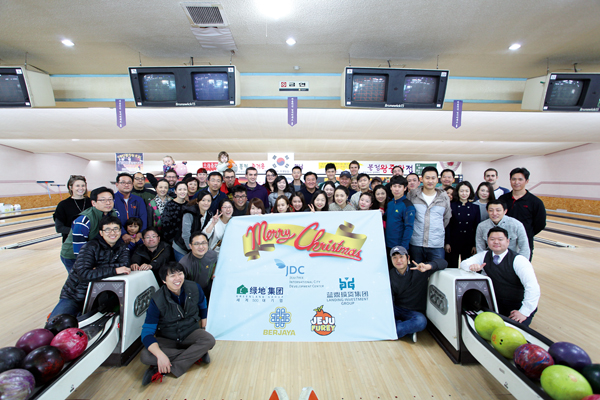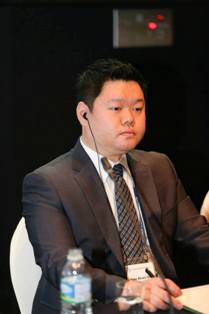| |
 |
|
| ▲ The drive of Albert Oh (far bottom right) has been essential for the JDC’s partnership with Jeju Furey, such as the bowling event above to raise money for Jeju orphans. Photo courtesy JDC |
“This isn’t just about business, it is about how people share together.”
The JDC’s Albert Oh says it is his “secret personal mission” to instigate the meaningful cultural changes that will add substance to the 2002 ordinance which created “Jeju Free International City.” Many islanders ponder what the title means for them, but for Oh it is straightforward: “It is about communi-cation and connecting people.”
The law also created the Jeju Free International City Development Center (JDC), where Oh is currently project manager for Jeju Healthcare Town, developing strategy with investors such as the Chinese Greenland Group, and he works closely with Jeju Airest, a resort development in Seogwipo. His role is fundamentally communicative, selling the “unseen,” as he puts it.
Oh appreciates the value of communication like few others. The 32-year-old was born of a Japanese-speaking Korean-Japanese mother and a Korean father; gestures and dictionaries were their only tools of mutual comprehension. Oh found himself interpreting from the age of 7: “That’s how my communication responsibility started,” he said.
After moving to Saipan in the western Pacific to escape anti-Japanese sentiment in Korea, Oh was soon the only family member able to speak English. He thus became his parents’ interpreter again, this time becoming their bridge to the culturally mixed community.
The JDC is continually seeking to build such bridges itself as Jeju diversifies and reorients itself globally. In liaising between foreign investors and the local community, the corporation encounters many obstacles and it is often Oh’s role to understand cultural nuances and “unlock the doors” that might otherwise remain locked.
An example of the JDC’s work is a fundraiser which contributed to the 2013 Jeju Furey Christmas Orphanage Drive. The Furey Foundation is a Jeju charitable organization which fundraises for in-need local families, bringing the Korean and expat communities together for participative events in the process. The JDC supported Oh in organizing a bowling event between the JDC, investors and the Furey Foundation.
“I talked with the JDC bowling club and said, ‘Let’s do something with Jeju Furey.’ " Oh then took the concept further and organized what “seemed impossible” - bringing Malaysian and Chinese investors alongside JDC employees and local expats to “have fun” and raise money. It was a groundbreaking effort which won his team an internal JDC innovation prize for corporate social responsibility and led to his eventual appointment as a Furey executive.
| |
 |
|
| ▲ Albert Oh believes that building an international city is about much more than just attracting inward investment. Photo courtesy Albert Oh |
The JDC is firmly behind such internationalization measures, examples of which are barely noted in more cosmopolitan cultures. The mission for the Oh is to normalize intercultural exchange here so that such events between Koreans and non-Koreans are not extraordinary, but commonplace. This is a change which is much less tangible than FDI investment figures.
“It is important to spread this message that foreigners are not just here making money and going home ... Charity is young here, so we need someone here to show Koreans that the foreign community is putting in effort to help local people.”
Situated in the hinterland between Japan and Korea for much of his life, then moving to Saipan, Oh has both been challenged and enriched by his experience of being an outsider. Such experiences taught him the values of diversity and tolerance.
“[In Saipan] I was blessed with lots of good friends: Chamorros, Chinese, Filipinos, Americans, Canadians. In my class there were seven or eight different nationalities. It was natural for us to get along. I learned the true meaning of an international city,” he said.
Upon returning to Seoul for university, he found his Japanese connections now worked to his advantage: “Everything had changed ... I was now a rock star because I could speak Japanese.” His linguistic and social skills secured him a place on the Hankuk University of Foreign Studies student council and he began what he does now, “getting people together for events.”
Oh soon realized that barriers between Koreans and non-Koreans were more than just linguistic and he organized trips to the countryside to increase intercultural understanding. His social and academic pursuits attracted interest from “big companies” upon graduation; yet he wanted a challenge, choosing Shanghai: “It was one of the most terrifying, but educational experiences of my life.”
A year in the Chinese megacity taught him the intensive, competitive and temptatious essence of an international city. Working in the cutthroat world of gaming, Oh was an outsider again; this time, however, success was not as easy to come by. He never quite mastered the language and found himself outpaced by the high-octane lifestyle. It was time for a move back home, to a new home.
His parents encouraged his move to Jeju, where they had settled. After trying other roles, he was headhunted by JDC in 2010, and he eventually embraced his new role, again connecting people and cultures.
It is in such retrospective patterns that one might sense the workings of fate, as Oh’s lessons of the family, school, university and wider society are now utilized by JDC to head Jeju in a global direction.
“I truly believe it is not just about bringing foreign investment... Money comes and goes. We need to learn how to work together between Korean and non-Korean. These things [participative charity events] need to be done more, so the people can say, ‘Wow, we are doing something wonderful.’ Charity is like ‘ground zero,’ where it begins... We need to build it here and now.”
For more information about JDC visit english.jdcenter.com. To learn more about the Furey Foundation visit jejufurey.weebly.com. |





















